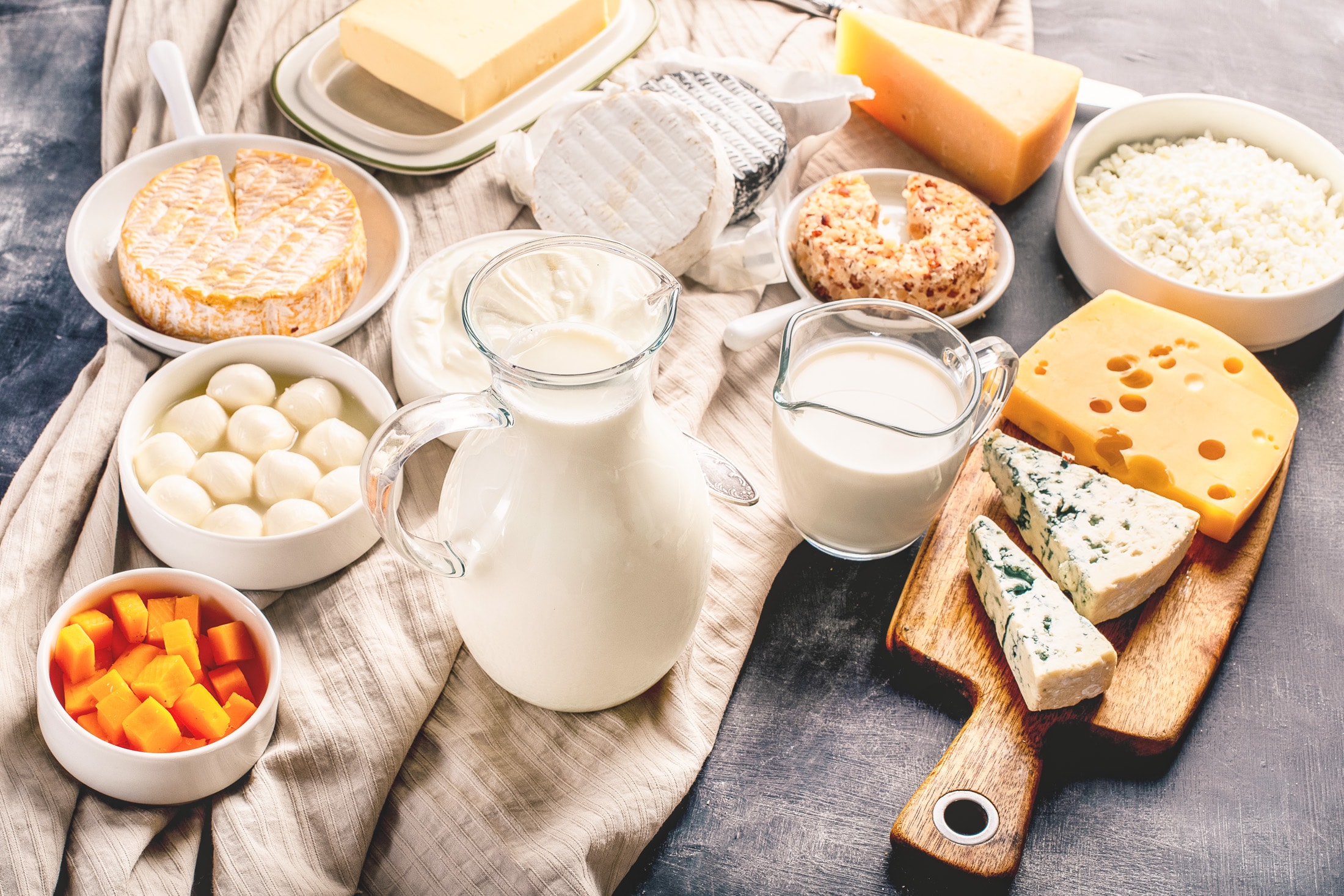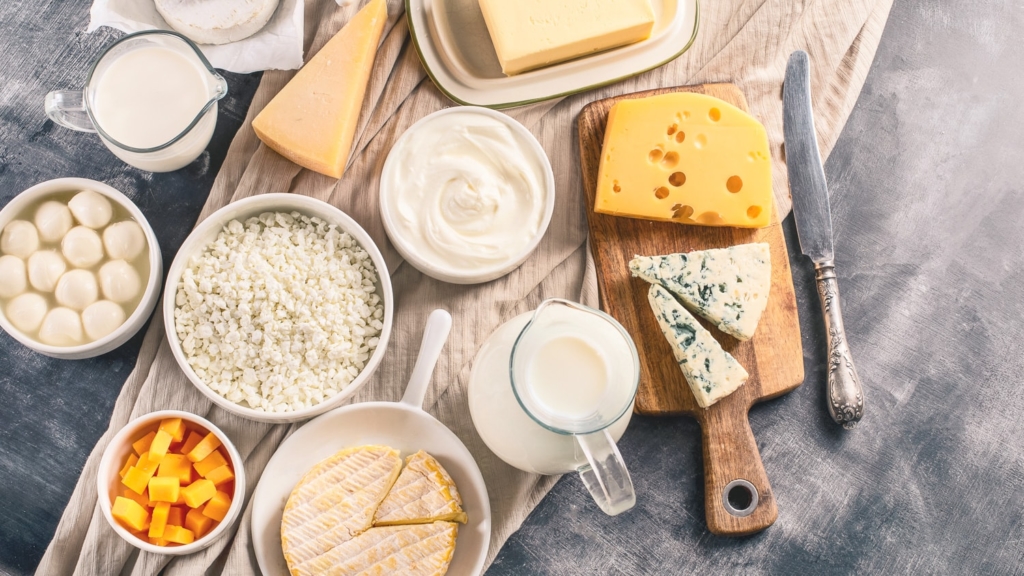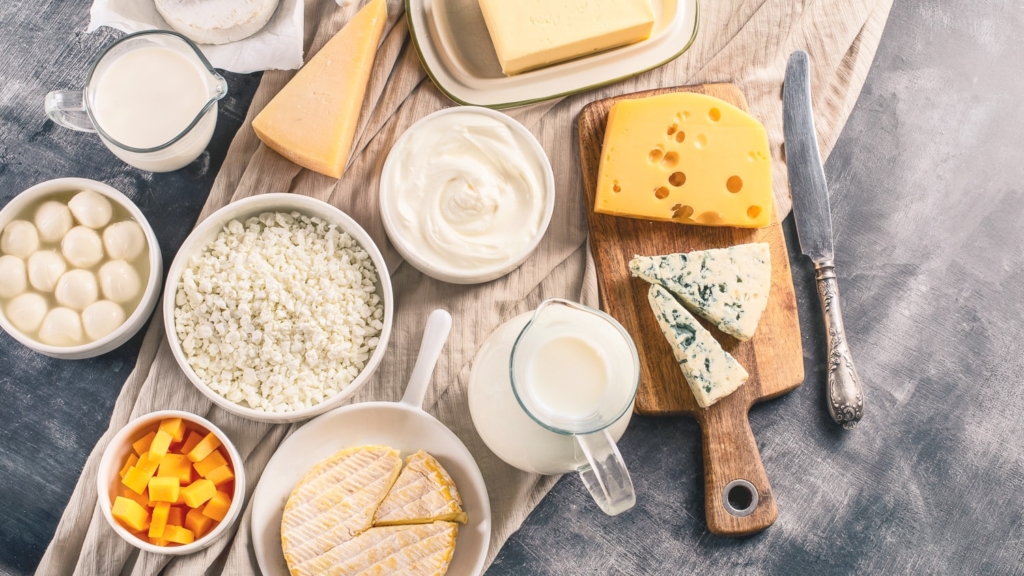Dairy and Inflammation: What is the story? The conversation is broad, and many studies show an array of differing opinions when it comes to the human consumption of dairy. It’s also not as simple as we first thought it might be to establish a concise conclusion about whether dairy is “good” or “bad.” The first thing we do know is that listening to your body is crucial, and lactose intolerance (an acid found in milk and dairy) is very real and not a new conversation. In fact, around 65% of the population find it difficult to digest dairy due to lactose intolerance, a consequence of genetics1 and even ethnicity,2 leaving 35% with lactose persistence3, the ability to digest dairy after being weaned. The second thing we know is that dairy does have the potential to impact inflammation in the body, and this can manifest as acne, bloating, and gut discomfort.
Humanity has been milking animals for centuries. Images found in tombs of Egypt4 inspire the imagination, and there has been an evolution of how milk and subsequent milk products were adapted to help humans digest them easier, whether it was fully conscious or not. For example, cheese, cream, and butter may have been developed as an alternative to drinking milk straight from the cow. This kind of evolution probably was because, although not scientifically examined at the time, creating cheese, cream, and butter reduces the amount of lactose in dairy. Thoughtco.com has a great article on the Ancient History of Producing Milk5 and also Lactose Intolerance and Lactose Persistence67 They are worth a read especially as modern dairy farming looks foreign to what once was.
Factory farming is now common across the US, and the modern dairy cow produces six to seven times more milk than they did a century ago. The natural process for a cow to produce milk in factory farming is now a thing of the past, with hormone treatment increasing the milk production and antibiotics being used for infection. Factory farming is vast, and the US is the leading producer of milk, with India and China up next.8
The Dairy industry is one of the largest in the world despite many humans being intolerant to one of its primary components, lactose.9 Some concerns about the manufacturing of milk and milk products are just how much lactose is in the products, and many health professionals and nutritionists suggest labeling its content as standard practice.10
When looking at the potential inflammatory consequences of milk and dairy products, we must also make a note of how nutrients found in them benefit the human body too. For example, milk protein can be easily digested and absorbed, with one study showing how it supports Muscle Protein Synthesis (MPS), helping muscles repair after exercise.11 The Calcium found in milk, yogurt, and cheese supports bone health12 and cell function. Vitamin D found in Dairy products can be essential for bone, immune, and inflammation health, with many companies fortifying their milk with Vitamin D.13 Then there are the probiotics, the good bacteria found in dairy which supports good gut health and immune function.14
When it comes to why dairy can cause inflammation for some, the conversation mainly stems around its saturated fat content and the lactose sugar content. It is suggested that these two elements could be the root of why inflammation flares up.15 The estrogen steroid hormones used to treat dairy cows has been linked to health concerns such as prostate and breast problem in men and women, and as it is documented, chronic inflammation is a perfect environment for bad cells to form, survive, and migrate.16 The way lactose can react in the gut is also deemed a result of inflammation, with bloating and cramps being a common sign of lactose intolerance.17 One final area of inflammation that manifests for some after consuming Dairy is Acne,18 which is connected to the hormone factor already mentioned19 too.
One other area of discussion around dairy is its connection to joint issues, with one study showing that dairy products consumption increased low-grade inflammation in the body. One study, of 40,000 people, who suffer with cartilage degeneration showed that those who consumed dairy products were more likely to need a hip replacement.20 Other people living with joint issues were shown to be sensitive to a particular protein found in dairy.21 One other study we will mention is that of bacterias in beef and dairy products, and how they can have adverse effects on those suffering from serious joining problems.22
Of course, the quality and source of what we consume is also a factor. A study released in 2013 notes many differences between organic and conventional milk with a 50% higher content of Omega-3 fatty acids in Organic milk, which are good for cardiovascular health and neurological development and function, as well as having zero antibiotic, hormone, or pesticide traces.23
In conclusion, and as one article notes, “Dairy is neither the hero nor the villain.”24 It does have the potential to cause inflammation in the body, and it does also provide nutrients to the body that could be invaluable, not to say that these nutrients can’t be found in other foods as well, of course. So, when it comes to dairy, it is essential to listen to your body, understand what you are consuming, choosing organic where possible, and doing all you can to reduce any foods that trigger inflammation and discomfort, especially in the gut and joints. Here at X5 Naturals, we are passionate about reducing inflammation in the body and increasing how many nutrients we absorb. We believe that eating a varied diet rich in pre and probiotic foods, lowering sugar consumption, and paying attention to how many dairy products you consume could potentially reduce and prevent inflammation forming.
Related Products
1. https://ghr.nlm.nih.gov/condition/lactose-intolerance#statistics
2. https://www.dairynutrition.ca/scientific-evidence/lactose-intolerance-and-milk-allergy/prevalence-of-lactose-intolerance
3. https://www.ncbi.nlm.nih.gov/pmc/articles/PMC3048992/
4. https://www.thoughtco.com/dairy-farming-ancient-history-171199
5. https://www.thoughtco.com/dairy-farming-ancient-history-171199
6. https://www.thoughtco.com/lactose-intolerance-and-lactase-persistence-170884
7. https://www.ncbi.nlm.nih.gov/pmc/articles/PMC3048992/
8. https://modernfarmer.com/2014/03/real-talk-milk/
9. https://www.ncbi.nlm.nih.gov/pmc/articles/PMC4586535/
10. https://www.ncbi.nlm.nih.gov/pmc/articles/PMC4586535/
11. https://www.ncbi.nlm.nih.gov/pmc/articles/PMC4632440/
12. https://ods.od.nih.gov/factsheets/Calcium-HealthProfessional/
13. https://ods.od.nih.gov/factsheets/VitaminD-HealthProfessional/
14. https://www.ncbi.nlm.nih.gov/pmc/articles/PMC5622781/
15. https://www.healthline.com/nutrition/is-dairy-inflammatory#dairy
16. https://www.ncbi.nlm.nih.gov/pmc/articles/PMC2803035/
17. https://www.ncbi.nlm.nih.gov/pmc/articles/PMC6316316/
18. https://pubmed.ncbi.nlm.nih.gov/29778512/
19. https://www.healthline.com/health/dairy-and-acne
20. https://www.arthritis.org/health-wellness/healthy-living/nutrition/healthy-eating/dairy-and-inflammation
21. https://www.healthline.com/health/foods-to-avoid-with-arthritis#sugars-and-refined-carbs)
22. https://www.ucf.edu/news/study-finds-bacteria-milk-linked-rheumatoid-arthritis/
23. https://www.sciencedaily.com/releases/2016/02/160215210707.htm
24. https://www.health.harvard.edu/blog/dairy-health-food-or-health-risk-2019012515849
Medical Disclaimer: All content found on the x5naturals.com website, including text, images, audio, or other formats were created for informational purposes only. It is not intended to provide medical advice or to take the place of such advice or treatment from a personal physician. All readers/viewers of this content are advised to consult their doctors or qualified health professionals regarding specific health questions. The publisher of this content does not take responsibility for possible health consequences of any person or persons reading or following the information in this educational content. All viewers of this content, especially those taking prescription or over-the-counter medications, should consult their physicians before beginning any nutrition, supplement or lifestyle program. Links to educational content not created by X5 Naturals are taken at your own risk. X5 Naturals is not responsible for the claims of external websites and education companies.



